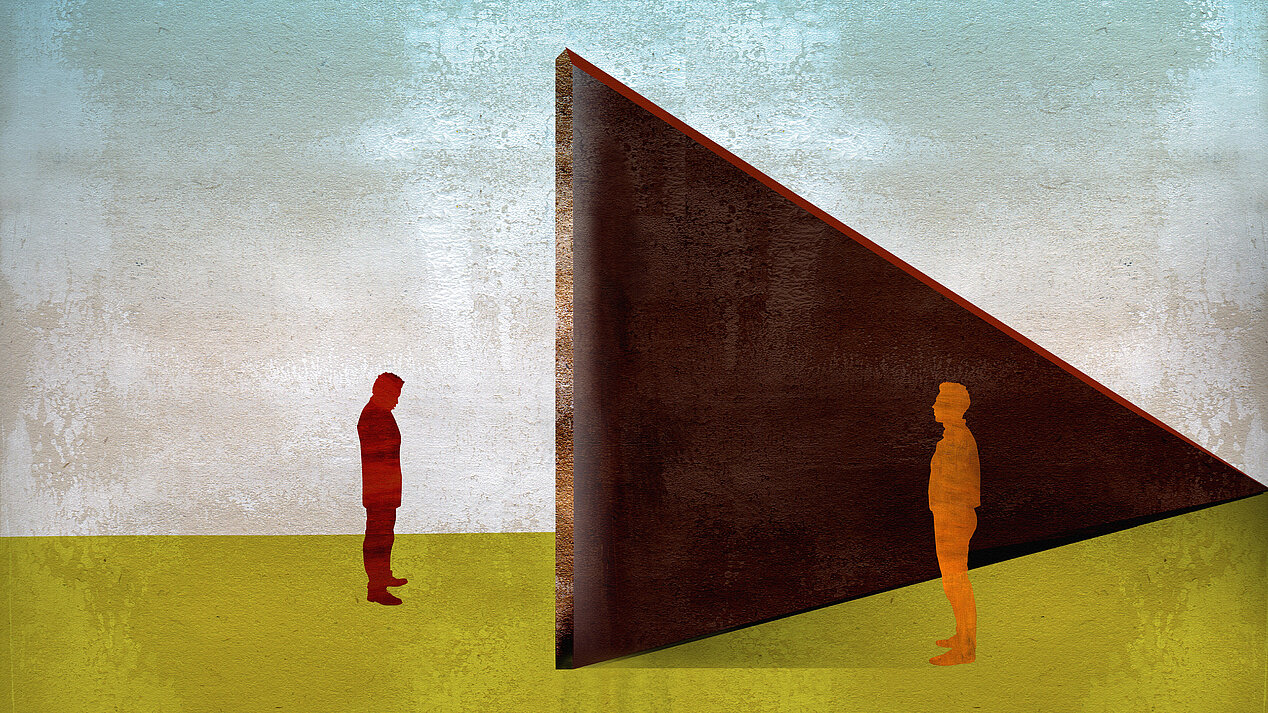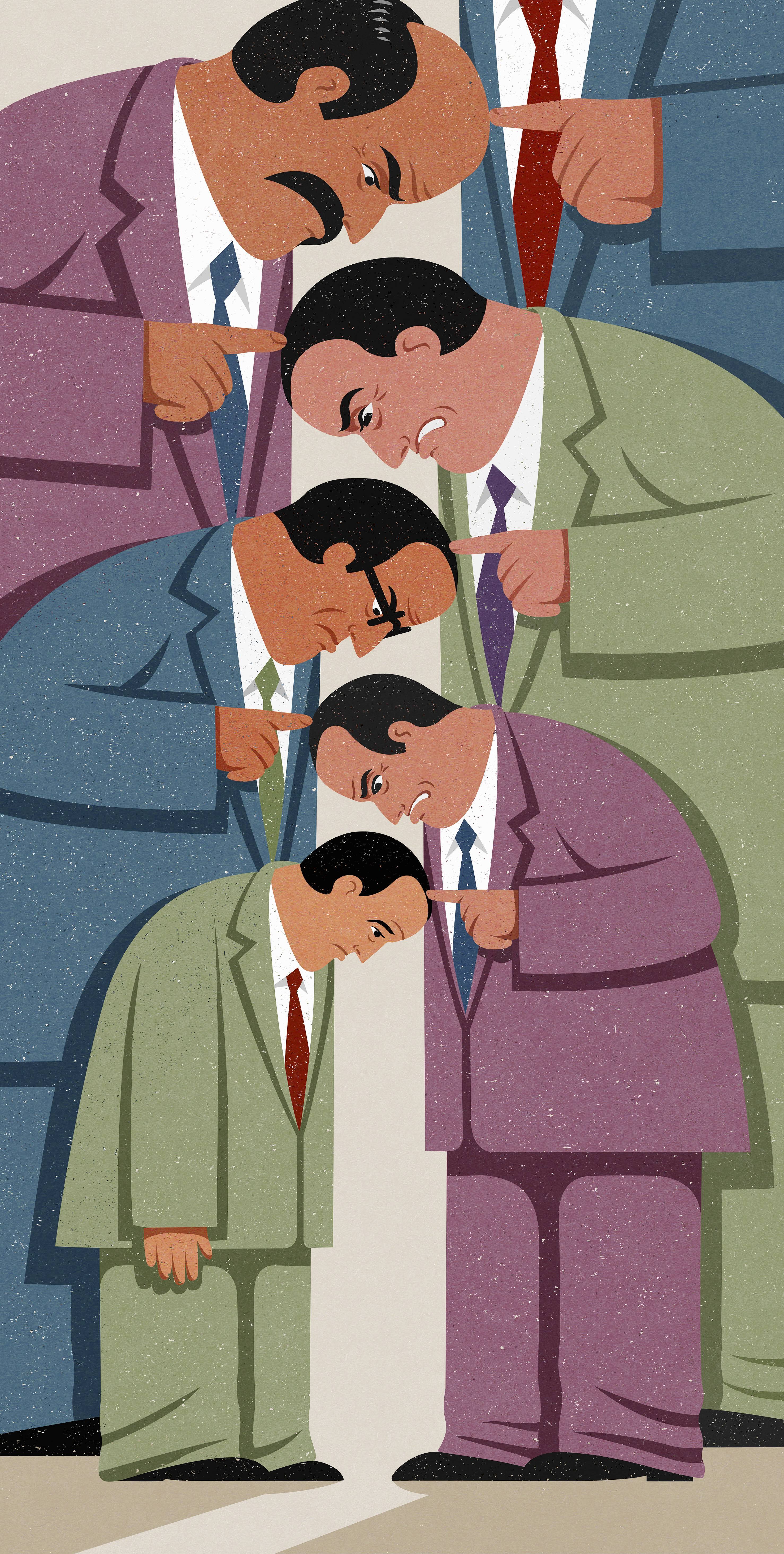
Salwa Bakr lives in Cairo and is one of Egypt’s leading writers. She campaigns in the media for intercultural dialogue between the Arab and Western worlds. Her novels and short stories focus on the situation of women in Egypt.

I t was not by chance that ancient Egyptians worshipped and sanctified the animals around them, such as eagles, crocodiles and the white ‘Beno’ bird whose power lies in its bitter-tasting meat that other animals cannot chew or swallow. The power which lies at the root of feelings of superiority serves as the justification for rising above other nations and also for ‘correcting’ it when required. Many wall paintings in ancient Egyptian temples point to this in their depiction of the captivity of the Jews in Babylon.
The idea of superiority over others lies at the centre of all ethno-cultural racism. It is often fuelled by the fires of sedition, whether within local societies or at international level. This idea of superiority justifies violence and aggression and is linked to cults of worship and the use of power in an inhumane way.
Every political, economic or military conflict is driven and fuelled by cultural ideas. Aggression against others can be based on the idea of being different from them. And even though religion is a part of culture, it can once again stir up violence and adapt it to its own requirements because it is holy and absolute.
I remember how in the 1970s the Egyptian government used to import live sheep from Bulgaria to be sold and slaughtered as a sacrifice during the Islamic sacrifice festival, as ordained by the prophet Ibrahim and his son Ismail. But the Egyptian people refused to buy or slaughter these sheep, despite the fact they were so cheap, because Bulgaria was a communist country and its people were infidels. People made fun of these sheep because they looked different to Egyptian sheep.
Another example: apart from during the Second World War, when the British had Indian troops in their army and Egypt and India were part of the British colonies, most Egyptians had never had any contact with Indians. They soon began calling Indians stupid once they discovered that they were pagans who believed cows were holy. This situation seems to be religious, but in fact it has a cultural core – the hostility towards British rule. This seemingly religious aspect is in actual fact of a cultural nature.
Cultural reference points formed by religion provide the perfect example of how conflicts are fuelled. The Jews thought they were God’s chosen people, while the Muslims took pride in the fact that they were the nation that reached out to people, but they still termed as ‘strange’ anyone who could not speak Arabic. The Persians were also called strange, despite their cultural superiority over the Arabs in the Middle Ages.
Every political, economic or military conflict is driven and fuelled by cultural ideas.
Arab historians categorise the revolutions and conflicts caused by economic and social problems that were triggered by the Persians against Arab Islamic states as racist revolutions against Islam. They claim that these revolutionaries were morally degenerate, having sexual relationships and accepting public relationships that were prohibited by Islam, and were themselves infidels. Centuries later, the British occupiers used these exact ideas to stir up the Egyptian people against communism and communists.
And this is still going on today: after the protests erupted in Egypt on 25th January 2011, political Islam used these arguments against the civilian secular movement during the subsequent first parliamentary elections and the referendum on the constitution. Anyone who was secular or civilian was an infidel and therefore morally degenerate by nature. During the elections, the Islamists made it clear that anyone who voted for the constitutional articles that were in their interests would go to heaven, and anyone who voted against would go to hell.
In some regions of the world where illiteracy and ignorance are widespread, the popular culture that is infused with religion still provides the fuse for igniting conflict. Conflicting powers usually play on the elements of this culture to stir up the masses and convince them that they are the side that represents them and that it is in their interests to fight against the other camps.
During the civil war in Sudan which resulted in the division of Sudanese lands into two countries, the war and subsequent partition was given a cultural justification. But the fact that Sudan is a multicultural country does not justify this partition. The problem was and remains the authoritarian government that is based on the fallacy of religious rule. This is responsible for the problems and tragedies that have beset this country that is so rich in natural resources. The ruling regime did and still does not only persecute people in the south, but all citizens. Muslims and Christians all continue to suffer oppression. Everyone turned to cultural differences to fuel the conflict and conceal the economic reasons that lay at its core.
During the protests on 25th January, official media loyal to the Mubarak regime ran a campaign against the revolutionary and liberal movements that was based on popular cultural references.
During the civil war in Sudan, everyone turned to cultural differences to fuel the conflict and conceal the economic reasons that lay at its core.
One media representative specifically focused on attacking Dr Mohammed ElBaradei, the former director of the International Atomic Energy Agency, saying that ElBaradei was out of touch with the Egyptian people. He had lived most of his life outside Egypt and worked for the United Nations. He knew nothing about how farmers have to sit on the ground and lame their ducks, force-feeding them with beans or corn and pouring water down their throats to fatten them up because there is no time for the ducks to feed themselves naturally.
This was how the media tried to make fun of ElBaradei, making out that he lived in an ivory tower far removed from the real lives of poor Egyptians. Then there were the virginity tests carried out by some army officers on girls who had been arrested for protesting in Tahrir Square during the 2011 uprisings. In this way, the army tried to incite public opinion against the demonstrators, as popular culture equates moral virtue with virginity. It damaged the reputation of these girls, meaning that most families then prevented their daughters from joining the protests against military rule and calling for democracy.
This calls to mind how, during the student revolution in Egypt in 1972, many illiterate young men clashed with the central security forces after some protesters claimed that soldiers had been molesting and harassing female demonstraters. This aroused a great deal of public sympathy and support for the student protesters, as molesting young girls is viewed as a very serious crime.
It is clear that cultural issues are constantly being used to fuel conflicts. Another example is the first Iran-Iraq War during the time of Saddam Hussein’s rule. The roots of the conflict go back many hundreds of years to the rivalry between Mesopotamia (present-day Iraq) and Persia (Iran). A primary ideological and cultural reason for the outbreak of the war was the desire to control the resource-rich province of Khuzestan – the battle between Arabs and Persians to liberate the majority Arab population of Arabistan from their foreign rulers. On the Iraqi side, this ideology was so successful that even Shiite Iraqis made a significant contribution to the war against Shiite Iranians.
This culture of getting to know the ‘other’ by travelling and gathering personal experience led to greater knowledge of the West, its art and its culture.
However, culture can also be a positive weapon for ending or mitigating conflict, but lack of cultural knowledge about the ‘other’ can lead to a great many mistakes being made. In the past, many young people have left the Islam world to study in the western countries, living for some years in the West, getting to know the way of life and the local people. This produced generations of people who had an understanding of others and escaped from intolerance.
This culture of getting to know the ‘other’ by travelling and gathering personal experience led to greater knowledge of the West, its art and its culture. But today it seems that this kind of curiosity about the West has been subordinated to a greater project of national renaissance, and the time of returning home with direct experience of other cultures is over. Fewer and fewer young people now have an opportunity to get to know other cultures through direct daily contact. This is a totally different situation from those people who move to the West specifically in order to bolster their cultural prejudices and further convince themselves that the West should be feared.
Those who carried out the 11th September attacks on the World Trade Center in New York were these new types of people who come to the West to confirm their prejudices. Many of these people believe the West is evil, only looks after its own interests and has hated Islam and Muslims since the time of the Crusades.
This stance is intensified by the bitterness caused by the history of Western imperialism and its support for the state of Israel. Such people feel that violence is their only form of expression, and their religious and cultural points of reference lead them to fight with the Taliban in Afghanistan or become pirates in Somalia in the name of religion. They believe they are fighting a just war against the (Western) infidels, seeing it as a struggle for God and religion. Unfortunately, the practical steps being taken to combat what has become known as international terrorism are not enough. The problem is rooted in culture. It arises from a desire to obliterate the ‘other’ because the cultural significance of the ‘other’ should be obliterated.
Many years ago, I met an Egyptian in Zurich who worked at the Swiss cultural institute Pro Helvetia. He was happy to meet an Egyptian writer who was been hosted by the institute. But he told me that he was going to send his 11-year-old daughter to Egypt because he was worried about her growing up in Swiss society. He believed Swiss society was morally degenerate and that sexual relationships were widespread between boys and girls. I said to him: “Yes, but you live in the West, and your wife, the mother of your children, is Swiss. You met her and married her for love, so why can’t you allow your daughter to do the same?”
This is a common example of a Muslim man who should be a role model because he is part of a modern culture. There are also many examples of girls, the daughters of third- and fourth-generation immigrants, who wear the veil but do not speak Arabic. They live in the West but retain their Muslim identity and culture. They are accepted by open-minded Europeans.
Their religious and cultural points of reference lead them to fight with the Taliban in Afghanistan or become pirates in Somalia in the name of religion.
Many students who attend American and foreign universities are not anti-Western, but they retain their religious culture. They are keen to find an alternative Islamic culture in the West. They are living examples of a Western style with an Islamic identity: wearing jeans and make-up does not mean they cannot also wear the veil. They also do not find it a contradiction to speak English or French at home while fasting and practising their religious customs.
Political Islam also produces thinkers who not only reject the ‘other’, but also hate it and are prepared to use violence against it. This was the case when a Danish cartoonist made a drawing that insulted the Muslim Prophet, or when a member of the Danish parliament for no obvious reason chose to demonise Islam and Muslims. There is no serious cultural dialogue that provides explanations for this behaviour.
This Muslim anger that is rooted in Christians’ hatred of Muslims and their hostility towards them during the Crusades will produce nothing but more young volunteers from Egypt, Saudi Arabia, Yemen, Pakistan and other Arab countries for the war with the Taliban. The absence of dialogue provides a foundation for cultural and religious fanatics who believe there is no hope for the West; there is then no reasonable thinking or understanding about others.
Those who favour political Islam ask themselves why the West is remaining silent about the massacre of Muslims in Myanmar but was outraged at the genocide in Rwanda. The only explanation the Islamists have for this contradiction is that those being massacred are Muslims, and the West hates Islam and Muslims. And perhaps some of these Islamists think it is a good idea to plant a bomb or carry out an act of violence in order to protest against the West’s hostile attitude to Muslims. We remember violent acts such as the attempt to burn down the Danish embassy in Beirut as part of the protests against the Danish cartoons that insulted the prophet. The absence of dialogue and lack of understanding of other cultures brings nothing but more violence and more destruction in the world.
The talks about Nile water that were held after the revolution of 25th January show that this problem is basically a cultural issue. The attitude of ignoring black Africa that was prevalent among Egyptian diplomats and civil servants and their cultural discrimination against the countries of the Nile basin was the reason why these countries reconsidered how the waters of the Nile should be distributed, and particularly Egypt’s share. Egypt, the country with the largest share, seemed to be indifferent to the problems faced by these other countries.
Serious cultural dialogue and acceptance of the other’s culture form the foundation for culture as an effective element in resolving international conflicts.
A good result was only finally achieved after an Egyptian delegation that included some of the 25th January revolutionaries travelled to these sub-Saharan countries and assured them that the Mubarak regime and its representatives had not only discriminated against the countries of the Nile basin but also against the Egyptians themselves. Egypt is an African country, but the Mubarak regime treated Black Africa, and particularly the countries of the Nile basin, as though they were a group of totally different nations.
Serious cultural dialogue and acceptance of the other’s culture form the foundation for culture as an effective element in resolving international conflicts and clashes between different groups. But this dialogue has to be fair and we need to be seeing with both eyes, not just one. Looking at the problems of others with a sympathetic eye is essential for constructive and productive dialogue.
Some people wonder how the West can criticise human rights in China while still supporting repressive and dictatorial regimes, as was the case with Mubarak. They also ask why the West has remained silent about the revolution in Sudan and the oppression of the opposition by the Sudanese regime, while concentrating on the Syrian opposition and the massacres committed by the Bashar Al-Assad regime. The attitude of the West is based only on interests, not on empathy or objectivity. This precludes the kind of cultural understanding that can bring to an end conflicts all over the world.
Yes, the cultural element is important and effective. And perhaps it can be the basis for resolving some international conflicts – but only if it is used objectively and fairly.

Salwa Bakr lives in Cairo and is one of Egypt’s leading writers. She campaigns in the media for intercultural dialogue between the Arab and Western worlds. Her novels and short stories focus on the situation of women in Egypt.
Culture has a strategic role to play in the process of European unification. What about cultural relations within Europe? How can cultural policy contribute to a European identity? In the Culture Report Progress Europe, international authors seek answers to these questions. Since 2021, the Culture Report is published exclusively online.

